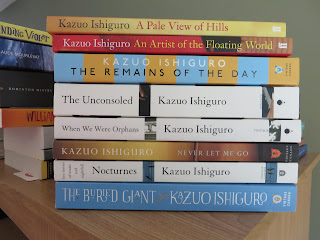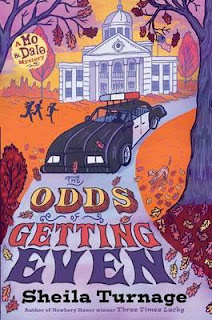So one of my reading challenges this year is to read the books that I haven't already on this mug and one other, "The Banned Books" mug.
And it's been quite a challenge, because some of these books, while being 'great' or 'banned' are a challenge to read. Either it' s the language, the writing or mostly the content that is hard to digest.
So this summer I decided that I needed to put in a concentrated effort to make myself read some of these books (which I will talk about soon).
It has all been very heady stuff, and Beloved tops the stack at being a very challenging book to read. I made three first attempts before I finally made it stick. When I could stick with it I was engaged and anxious to get to the end, because I really couldn't see where the book was headed. I knew what I had hoped to see but that, of course, is no guarantee that an author will be considerate and take your own feelings or preferences to account. It won the Pulitzer Prize so you can almost bank it that this would be a stressful, ugly and painful novel about slaves. And it was. That's not really a spoiler.
Beloved is not the first book this year that I have read about slaves. Uncle Tom's Cabin by Harriet Beecher Stowe was tackled earlier on in February during Black History Month, and I had to make a few tries to start reading that one too. There are many similarities, but one thing I am extremely grateful for is that the speech is easier to read. It really bothered me that Stowe had most of her characters sound illiterate and it was so bad you could barely understand what she had them saying...
Beloved, was an easy read, and even when the speech was slang, I didn't have the need to parse what was said.
Morrison was clever to feed out the horrible parts in bits and pieces throughout the book, which was very kind and humane of her. It was a story which wound around you like a spell, with each divulgence, and then grasped you at the climax when everything was laid bare and horrible, holding you there until the very end.
At some point it feels like we as a people have written so much (too much!) about the horrible times in our history, and it feels like we are beating it long after it should have been laid to rest. I can honestly say that some people are total jerks for writing something this horrible and it has angered me very much. But I think that has more to do with how the author has treated the subject. Beloved is different. Toni Morrison wrote a thoughtful, insightful book about ex-slaves and the ghosts of their pasts which do come back to haunt them as any hard thing in a person's life does. It was real, honest and a way of writing that makes me think about those times soberly and with sadness, but not with anger. Like a story about the war, the Holocaust, or any other terrible event in our history, this too should be remembered all the time, because it happened, and it should never be forgotten, lest it should happen again.
















































